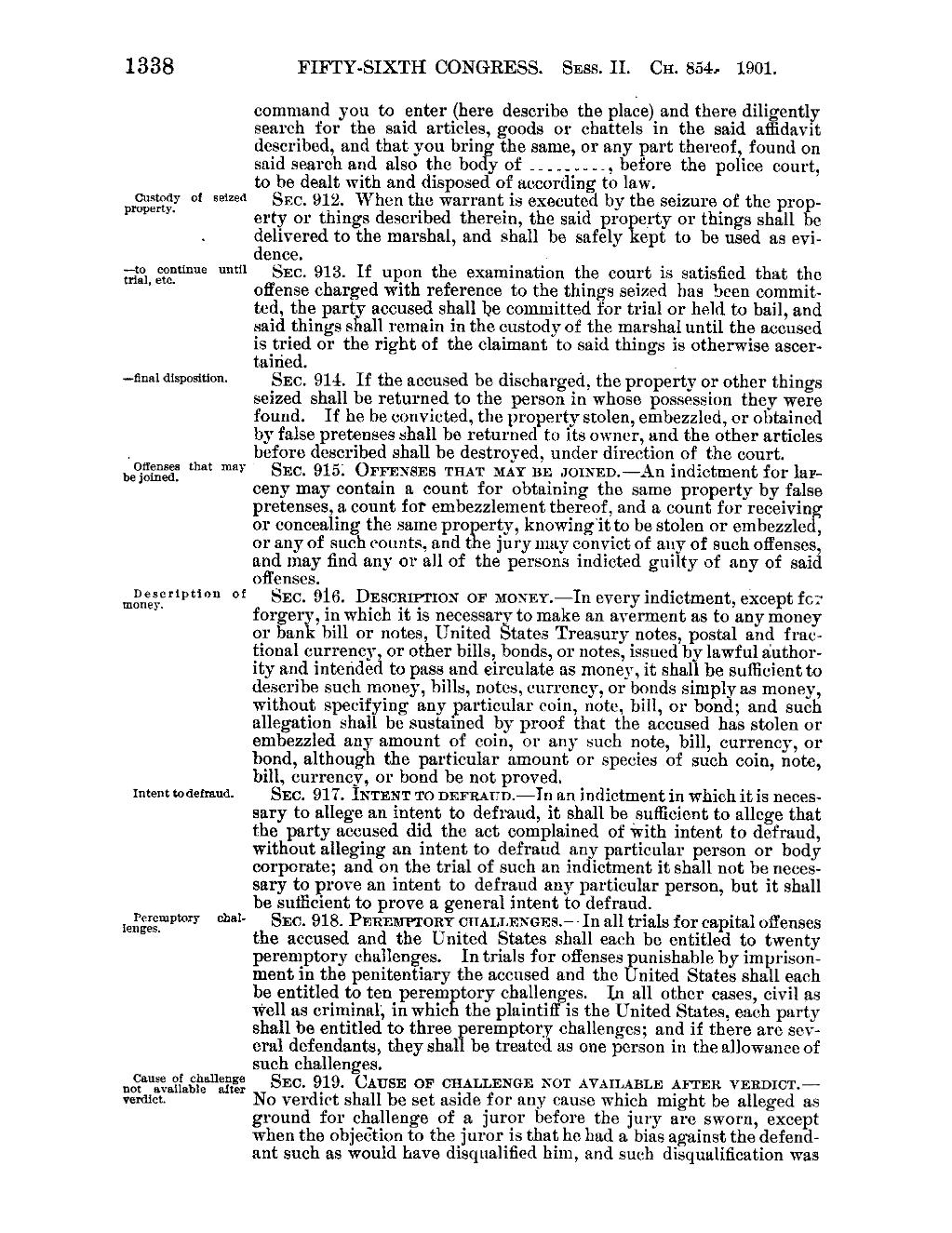1338 FIFTY-SIXTH CONGRESS. Sess. II. Ch. 854.- 1901. command you to enter (here describe the place) and there diligently Search for the said articles, goods or chattels in the said affidavit described, and that you bring the same, or any part thereof, found on said search and also the body of . , before the police court, to be dealt with and disposed of according to law. rg¤¤;;<;`<}v of Seized Sec. 912. When the warrant is executed by the seizure of the prop- P P " erty or things described therein, the said property or things shall be . delivered to the marshal, and shall be safely kept to be used as evidence. . Ejg gg¤¤¤¤€ ¤¤¤1 Sec. 913. If upon the examination the court is satisfied that the 'offense charged with reference to the things seized has been committed, the party accused shall be committed for trial or held to bail, and said things shall remain in the custody of the marshal until the accused is tried or the right of the claimant to said things is otherwise ascertained. c —¤¤¤1 ¤iS1>¤¤i¤¤¤- Sec. 911. If the accused be discharged, the property or other things seized shall be returned to the person in whose possession they were found. If he be convicted, the property stolen, embezzled, or obtained by false pretenses shall be returned to its owner, and the other articles . before described shall be destroyed, under direction of the court. b€Q‘*?¤ggS that may Sec. 915; Ormmsms THAT MAY BE Jo1NE1>.—An indictment for lar- Jvm - . . . ceny may contain a count for obtaining the same property by false pretenses, a count for embezzlement thereof, and a count for receiving or concealing the same property, knowingit to be stolen or embezzled, or any of such counts, and the jury may convict of any of such offenses, and may iind any or all of the persons indicted guilty of any of said offenses. _ mg¤i§_¤¤iP¢i¤¤ <>f Sec. 916. Dascnirrron or MONEY.—II1 every indictment, except for ` forgery, in which it is necessarv to make an averment as to any money or bank bill or notes, United States Treasury notes, postal and fractional currency, or other bills, bonds, or notes, issued by lawful authority and intended to pass and circulate as money, it shall be sufficient to describe such money, bills, notes, currency, or bonds simply as money, without specifying any particular coin, note, bill, or bond; and such allegation shall be sustained by proof that the accused has Stolen or embezzled any amount of coin, or any such note, bill, currency, or bond, although the particular amount or species of such coin, note, bill, currency, or bond be not proved. 1¤¢¤¤¤ wdefmud- Sec. 917. INTENT TO DEFRAUD.—In an indictment in which it is necessary to allege an intent to defraud, it shall be sufficient to allege that the party accused did the act complained of with intent to defraud, Without alleging an intent to defraud any particular person or body corporate; and on the trial of such an indictment it shall not be necessary to prove an intent to defraud any particular person, but it shall be sufficient to prove a general intent to defraud. Ielfgggmvmfy chai- Sec. 918. PEREMPTORY oHALLENGES.——In all trials for capital o§'enses ` the accused and the United States shall each be entitled to twenty peremptory challenges. In trials for offenses punishable by imprisonment in the penitentiary the accused and the United States shall each be entitled to ten perem tory challenges. In all other cases, civil as well as criminal, in which the plaintiff is the United States, each party shall be entitled to three eremptory challenges; and if there are several defendants, they shall) be treated as one person in the allowance of such challenges. mgaujgagfagglugggg Sec. 919. CAUSE or CHALLENGE Nor AVAILABLE AFTER VERDICT.—· verdict No verdict shall be set aside for any cause which might be alleged as ground for challenge of a juror before the jury are sworn, except when the objeetion to the juror is that he had a bias against the defendant such as would have disqualified him, and such disqualification was
